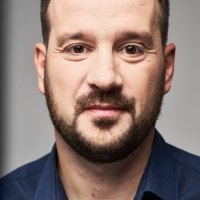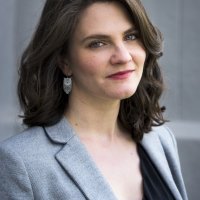Media Bans, Free Speech, and Disinformation in Ukraine
Ukraine has long been the laboratory for Russian disinformation campaigns. As a result, the Poroshenko and Zelensky administrations have named combatting Russian disinformation a top priority. Recently, President Zelensky signed a decree sanctioning three television stations affiliated with Viktor Medvedchuk, a Ukrainian oligarch with ties to the Kremlin. However, Ukrainian citizens are divided on this decision, with some believing it to be a necessary step and others finding it a restriction on citizens’ rights. In this panel, our speakers discussed whether bans like this are effective in fighting state-sponsored disinformation and what this decision implies for freedom of speech in Ukraine going forward.
Selected Quotes
Victor Andrusiv
"Concerning what has happened last month in Ukraine, Zelensky has made a very strong step, which was really unexpected of him, and blocked the channels which are related to Mr. Medvedchuk [...] This step actually has several problems, which actually, in my opinion, are not solving the problem with Russian propaganda. First of all, we should be looking for the real audience of these channels, and it was a really poor audience, and at the best time, these three channels could account for around 3% of television audience. So they are very small TV channels, and their influence was really limited on society, and we cannot connect support for Medvedchuk and his party with these channels. This is really important to note. The other problem to note is after these channels were blocked, this small audience did not go to pro- Ukrainian TV channels or other media projects. Most of them went to other TV channels with proximate discourse about Russian support, for example, the TV channel Nash, which has actually tripled its audience. This shows that the question of banning the channels is not the way this situation is resolved."
"This was a political decision which [doesn’t correlate well] with the law and constitution because he adopted sanctions against Ukrainian citizens who are in Ukraine. Previously, we already had situations where sanctions were adopted against Ukrainians, but these Ukrainians were not inside the state. For example, if you blame Mr. Medvedchuk or his formal owner of the channels, Taras Kozak, for cooperation with terrorists, you should use the legal instruments like prosecution, secret service, police; they should be detained or interrogated. When you go with these steps, it's not the proper instrument to deal with them because they’re inside Ukraine, and this could cause a lot of problems for [Zelensky] because months have already passed, the channels were blocked for financing terrorists, but Mr. Kozak and Medvedchuk did not visit our law enforcement agencies, which actually should happen. I am afraid that in a few months, they will have some court decisions on their side that this violated their rights."
Angelina Kariakina
"The decision to ban channels does not come alone as a decision against the channels. Several weeks ago, we had another decision from the Ukrainian National Security Council, which has a number of sanctions against Medvedchuk, personal sanctions against his wife, Oksana Marchenko, and against the families of his allies, which means that this specific step comes also with other activities that may ban lots of things that Viktor Medvedchuk is doing in Ukraine, not just media and politics but also money. Yesterday, there was fresh news coming from Ukraine. We had news from the Security Service that were a number of searches in companies allied with Medvedchuk’s gas station, Gluzko, so we can see it’s not only one thing that may look like a popular step among a patriotic audience and electorate in Ukraine but other steps are coming. We will see how they will play out in the courts and what the real effect of that will be, but it seems to be something bigger than just playing with Russian propaganda and Medvedchuk-owned or allied media."
"There are a lot of people watching from home or abroad who are asking themselves, why specifically sanctions? Ukraine is a European country with rule of law. Why there was no ruling of a court or why the Ukrainian national regulator didn’t do anything about that […] Obviously, it’s a matter of national security, and I think that Zelensky did not have lots of options here. If he would go, he or let’s say, the system he represents, would go after Medvedchuk’s media as the media for breaching professional standards or being politically biased or something else, I think he would have faced a great challenge here because the audience would be asking and the civil society would be asking, "What about other channels owned by other oligarchs?" It is impossible to talk about this specific step without understanding the general structure of the Ukrainian media market and the ownership of the Ukrainian media market."
Mykhailo Minakov
"Was it a successful step to actually counter Russian propaganda in Ukraine? I am also split [...] So I have tried to analyze the situation and decision on the closure of the channel and the persecution of Viktor Medvedchuk and his clan from the point of view of the political development of Ukraine, and current regime. Basically what I see is the basic constitutional principles are now endangered. By looking at the different major constitutionally defined bodies of power, bodies of authority, they are losing real power in contemporary Ukrainian politics. So the Cabinet of Ministers is very uninfluential, Parliament is very uninfluential. Now the Constitutional Court is blocked and cannot function properly. Instead, we see the rise of the Security Council that has turned from a [consultative] body, which is how it's mentioned in the Constitution, into the core coordinating center of the executive branch that also oversees a lot of different spheres. So for a post-Communist country, where the democratic quality of the political culture was always under question, here this kind of development is very worrisome."
"In a way, the three channels that are now closed, they do not deliver this pro-Russian message. This pro-Russian message, as Angelina was saying, was very specifically packed. However, we also do not see and do not hear now the voices of pro-presidential people who were in constant debate with this Opposition Platform For Life party. So these TV channels were a major discussion place between the ruling party and this kind of opposition. Now it’s gone, and this faction of Ukrainian society is now left on its own."
Speakers



Moderator

Founder, Sophias Strategies LLC; Former Fulbright-Clinton Public Policy Fellow
Hosted By

Kennan Institute
The Kennan Institute is the premier US center for advanced research on Eurasia and the oldest and largest regional program at the Woodrow Wilson International Center for Scholars. The Kennan Institute is committed to improving American understanding of Russia, Ukraine, Central Asia, the South Caucasus, and the surrounding region through research and exchange. Read more


Science and Technology Innovation Program
The Science and Technology Innovation Program (STIP) serves as the bridge between technologists, policymakers, industry, and global stakeholders. Read more
